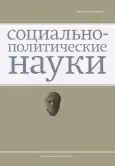Социологический анализ роли СМИ в формировании доверия к искусственному интеллекту
- Авторы: Разов П.В.1, Гараганов А.В.1
-
Учреждения:
- Финансовый университет при Правительстве Российской Федерации
- Выпуск: Том 13, № 1 (2023)
- Страницы: 74-79
- Раздел: Социально-политические исследования
- URL: https://bakhtiniada.ru/2223-0092/article/view/147806
- DOI: https://doi.org/10.33693/2223-0092-2023-13-1-74-79
- ID: 147806
Цитировать
Аннотация
В данной статье рассматривается вопрос, связанный с социологическим анализом роли СМИ в формировании доверия к искусственному интеллекту. Автором были изучены области применения искусственного интеллекта, его взаимосвязь со средствами массовой информации, а также понятие обработки естественного языка. Обработка естественного языка представляет собой одну из новейших технологий применения искусственного интеллекта и может быть интегрирована средствами массовой информации в процесс написания репортажей и текстов. Важное место в данной работе отведено авторскому исследованию, проведенному в августе 2022 г. Цель данного исследования заключалась в выявлении взаимосвязи между тем, как люди относятся к СМИ и искусственному интеллекту, а тем, как они оценивают заголовки, созданные журналистами или ИИ. По результатам исследования выявлена схожесть между текстами, составленными искусственным интеллектом, и текстами, написанными журналистами. В заключительной части статьи авторами сформулированы основные рекомендации по повышению доверия к искусственному интеллекту в контексте влияния на него со стороны СМИ. Ключевым выводом данной научной работы является следующий аспект: при автоматической генерации текста восприятие потребителями качества новостей играет важную роль для установления взаимосвязи между людьми и искусственным интеллектом.
Полный текст
Открыть статью на сайте журналаОб авторах
Павел Викторович Разов
Финансовый университет при Правительстве Российской Федерации
Email: PVRazov@fa.ru
доктор социологических наук, профессор, профессор кафедры социологии
Россия, МоскваАртур Владимирович Гараганов
Финансовый университет при Правительстве Российской Федерации
Автор, ответственный за переписку.
Email: arturcompany21@gmail.com
научный сотрудник центра «Локомотивы Роста» департамента социологии
Россия, МоскваСписок литературы
- Алейникова Ю.В., Матвеев В.В. Цифровая экосистема. анализ применения искусственного интеллекта // Здоровье – основа человеческого потенциала: проблемы и пути их решения. 2020. № 3. С. 1480–1487.
- Бегишев И.Р. Концепция развития регулирования отношений в сфере технологий искусственного интеллекта и робототехники: анализ основных положений // Baikal Research Journal. 2020. Т. 11. № 4. С. 15–34.
- Видясова Л.А., Видясов Е.Ю., Тенсина Я.Д. Исследование социального доверия информационным технологиям при предоставлении электронных государственных услуг и использовании порталов электронного участия (кейс Санкт-Петербурга) // Мониторинг. 2019. № 5 (153). С. 43–57.
- Долганова О.И. Улучшение клиентского опыта взаимодействия с искусственным интеллектом путем соблюдения этических принципов // Бизнес-информатика. 2021. Т. 15. № 2. С. 34–46.
- Жуков Д.С. Искусственный интеллект для общественно-государственного организма: будущее уже стартовало в Китае // Журнал политических исследований. 2020. Т. 4. № 2. С. 70–81.
- Кода Е.А. Влияние СМИ на формирование общественного мнения // Социология в современном мире: наука, образование, творчество. 2020. Т. 1. № 12. С. 131–134.
- Ларин С.Н., Елизарова М.И., Соколов Н.А. Анализ развития мирового рынка наукоемкой продукции на примере технологий искусственного интеллекта // Экономика и бизнес: теория и практика. 2019. № 5-2. С. 119–129.
- Лебедев А.Н. Доверие и недоверие недостоверной информации в интернете // Институт психологии Российской академии наук. Социальная и экономическая психология. 2020. Т. 5. № 2. С. 365–389.
- Лошкарев А.В., Дыдыгина Ю.Н. Вопросы цифровой среды доверия // Международный журнал гуманитарных и естественных наук. 2020. № 10-3. С. 124–126.
- Малышкин А.В. Интегрирование искусственного интеллекта в общественную жизнь: некоторые этические и правовые проблемы // Вестник Санкт-Петербургского университета. Право. 2019. Т. 10. № 3. С. 193–199.
- Синева Н.Л. и др. Инновационно-технологическое развитие и искусственный интеллект // Инновационная экономика: перспективы развития и совершенствования. 2019. № 2 (36). С. 397–404.
- Ястреб Н.А. Как проблема персональных данных меняет этику искусственного интеллекта? // Философские проблемы информационных технологий и киберпространства. 2020. № 1 (17). С. 491–504.
- Andras A. et al. Trusting intelligent machines: Deepening trust within socio-technical systems // IEEE Technology and Society Magazine. 2018. No. 37 (4). Pp. 76–83.
- Cassidy W.P. Online news credibility: An examination of the perceptions of newspaper journalists // Journal of Computer Mediated Communication. 2020. Vol. 12. No. 2. Pp. 144–164.
- Flanagin A.J. Credibility and trust of information in online environments: The use of cognitive heuristics // Journal of Pragmatics. 2021. Vol. 59. Pp. 210–220.
- Gretton C. Trust and transparency in machine learning-based clinical decision support / J. Zhou, F. Chen (eds.). Human and Machine Learning, 2018. Pp. 279–292.
- Strubell E., Ganesh A., McCallum A. Energy and policy considerations for deep learning in NLP // arXiv preprint arXiv:1906.02243. 2019. Vol. 9. No. 1. Pp. 291–307.
- Wagner A.R. et al. Overtrust in the robotic age // Communications of the ACM. 2018. No. 61 (9). Pp. 22–24.
Дополнительные файлы











